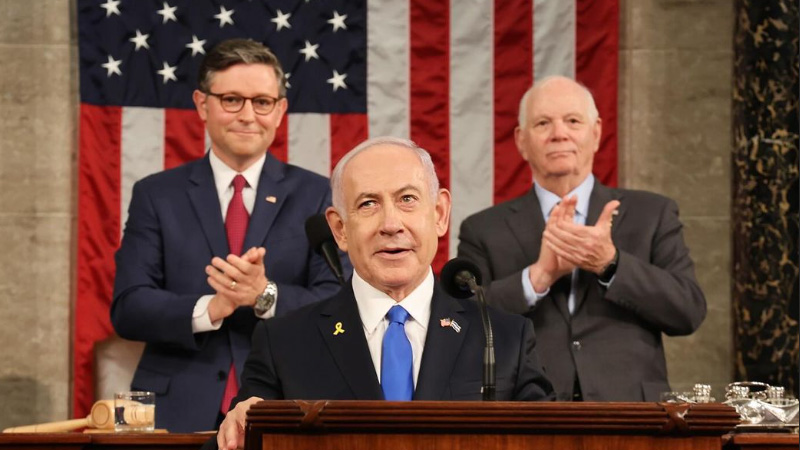Summary by Geopolist | Istanbul Center for Geopolitics:
Israeli Prime Minister Benjamin Netanyahu’s recent speech before a joint session of the U.S. Congress on July 24, 2024, was marked by contentious rhetoric and controversy. Key aspects include:
- Speech Overview: Netanyahu’s address, described as demagogic and manipulative, aimed to rally U.S. support for Israel’s ongoing conflict with Hamas and address strained relations with the Biden administration. His speech was met with strong reactions, including criticism from former U.S. House Speaker Nancy Pelosi and opposition from a significant number of Democratic Congress members.
- Congressional Reaction: The speech received enthusiastic support from some Congressional members, particularly Republicans, but faced criticism for its emotional manipulation and disregard for the broader context of the Gaza conflict. Critics in both the U.S. and Israel condemned the address as a political maneuver rather than a genuine attempt to address the conflict.
- Political Context: The invitation to Netanyahu was seen as a form of political pandering, with some viewing it as an effort to undermine the Biden administration’s stance on the Gaza conflict. The speech highlighted the political divide within the U.S. regarding support for Israel.
- Controversial Claims: Netanyahu’s speech included controversial claims and rhetoric, portraying Israel as a victim and justifying military actions against Hamas while dismissing criticisms and international legal challenges. He framed the conflict as a struggle between civilization and barbarism, and criticized international courts and domestic critics.
- International Criticism: Netanyahu’s address was also criticized for its lack of acknowledgment of broader historical and humanitarian issues related to the Gaza conflict. His speech was seen as an attempt to justify continued military action and rally political support without addressing underlying issues.
The speech underscored ongoing debates about U.S. support for Israel and the broader implications of the Gaza conflict on international relations and domestic politics.
Read more below.
Netanyahu’s Demagoguery Before Congress over the Gaza War
Prime Minister Benjamin Netanyahu delivered one of the most highly touted speeches of his political career last week before a joint session of the United States Congress in Washington. The longest-serving prime minister in Israel’s history appeared in top form: boastful, condescending, deceitful, engaging, and simultaneously manipulative of his captive audience. Aside from garnering domestic support in Israel, the prime minister intended the speech to put an end to nine months of strained diplomatic relations with the Biden administration by clarifying his murky objectives regarding the ongoing negotiations for a ceasefire in Gaza and his vision for the so-called “day after,” in American political parlance. Instead, his demagogic presentation morphed into a joint declaration of war on the Palestinian people interrupted by endless clapping and multiple standing ovations by members of Congress, particularly on the left side of the aisle traditionally assigned to Republicans.
Rhetorically, the speech on July 24, 2024, was deemed a hit by Netanyahu supporters but not by his critics in Israel or the United States. Indeed, none other than former US House Speaker Nancy Pelosi, who had a life-long political career of unwavering automatic support for Israel, characterized the Netanyahu speech as the “worst” in congressional history. About half of the Democratic members of both houses of Congress refused to attend claiming that the Israeli leader was using them as a prop for his political interests. Prominent Israeli critics, including both current and former political figures, felt it was a “terrible mistake” for Congress to invite Netanyahu to Washington. Israeli opposition leader Yair Lapid portrayed the fifty-five-minute speech as “a disgrace.”
Congressional Pandering Par Excellence
The formal invitation was issued on May 31, 2024, when the four top leaders of the US Congress extended an official bipartisan invitation to Netanyahu to address a joint meeting of Congress, a common procedure traditionally used to honor and give political exposure to key foreign allies, including such world dignitaries as Winston Churchill, Nelson Mandela, Queen Elizabeth, Pope Francis, Emmanuel Macron, Shinzo Abe, Narendra Modi, and others. Both the state of Israel and Netanyahu personally hold the “Olympic record,” for comparable appearances; indeed, the July 24 address is Netanyahu’s fourth such event and the tenth by an Israeli leader.
House Speaker Mike Johnson (R-LA), Democratic Leader Hekeem Jeffries (D-NY), Senate Majority Leader Chuck Schumer (D-NY), and Senate Minority Leader Mitch McConnell (R-KY) declared that their invitation was meant to highlight the special US relationship with Israel and express congressional support for what they perceive as a joint struggle against global terrorism that threatens regional and global stability. But why would Congress voluntarily demean itself by extending this undeserved honor to Netanyahu, a controversial political leader at home and in the United States, particularly during this turbulent period in the region and within the context of US domestic politics?
Traditional political pandering is the only logical answer to this question. Unfortunately, it is a quite widespread practice in congressional politics often displayed through catering to special interest groups and narrow constituencies in return for political contributions and votes. Netanyahu is not, by any standard, the most popular politician in Israel, or within the American Jewish community. A case in point is the noisy farewell he was given by the families of Israeli hostages and other critics as he departed Ben Gurion Airport for Washington. Indeed, several members of Israeli and US hostage families held alternative meetings in Washington during the visit to urge American officials in Congress and at the White House to exert pressure on Netanyahu to accept a hostage-ceasefire deal with Hamas.
Disreputable Guest Honored by Congress
The Israeli prime minister is an indicted politician facing, since 21 November 2019, charges of bribery, fraud, and breach of trust about questionable foreign arms transactions and other deals with wealthy moguls to exert control over Israeli media outlets. Furthermore, the International Court of Justice (ICJ) has accused the extreme Jewish nationalist government headed by Netanyahu of committing plausible acts of genocide throughout the ongoing war in Gaza. In addition, prosecutors at the International Criminal Court (ICC) have filed applications for arrest warrants against both Netanyahu and his Defense Minister Yoav Gallant, among others.
More importantly, Netanyahu and his extremist coalition government have not necessarily been the most cooperative ally of the Biden administration which has been the most supportive American government of Israeli policies since 1948, whether diplomatically, financially, or militarily. Indeed, the one-sided and misguided support for Israel’s war strategy by Biden is directly connected to the internal political crisis that led to his withdrawal from the Democratic presidential race. One can comprehend the logic of Republican attempts in Congress to reward Netanyahu in order to embarrass the Biden administration, but frankly, it is quite bizarre and dishonorable for Biden allies like Schumer and Jeffries to pander to Netanyahu at this critical and turbulent time within the ranks of the Democratic Party.
The Art of Distortion and Political Demagoguery
In his convoluted and divisive presentation, Netanyahu made an emotional attempt at rallying American support behind his puttering ten-month military campaign aimed from its inception in October 2023 at achieving total victory by destroying Hamas’s military capabilities and governing potential. The Israeli prime minister sought to avoid American loss of enthusiasm for his war as bipartisan murmurs in Washington, including comments by the new Republican vice-presidential candidate J.D. Vance, urging him to end the war in Gaza “as quickly as possible.” American and Israeli media reports of the week-long visit indicate that all key American officials who met face-to-face with Netanyahu, including Donald Trump, urged him consistently to “finish the job faster.”
Nonetheless, Netanyahu’s demands, as expressed in his speech, remained unchanged. He is not the type of politician willing to consider compromise, needless to say, retreat or defeat. According to Haaretz commentator Noa Landau, he did not travel all the way to Washington to end the Gaza war but to justify its further prolongation. His rationale went as follows:
- America, Israel, and our “Arab friends” in the region are facing a common enemy in Iran that must be defeated. “It’s a clash between barbarism and civilization … a clash between those who glorify death and those who sanctify life,” he urged his receptive congressional audience.
- Netanyahu’s subjective history of the Arab-Israeli conflict as presented to members of Congress began arbitrarily, on October 7, 2023, a day Netanyahu insisted “will forever live in infamy.” There was no mention whatsoever of the seventy-six-year-old Palestine conflict or the fifty-seven-year-old Israeli occupation of the West Bank, including East Jerusalem, Gaza, and the Syrian Golan Heights.
- Uncharacteristically for the pompous Israeli prime minister, he went out of his way to express his gratitude to President Biden, whom he described as “a proud Irish American Zionist” for his “tireless efforts on behalf of the hostages” and their families. However, no mention was made of the constant bickering and subversion of the administration’s repeated attempts at bringing about a long-term ceasefire and preventing a humanitarian crisis in Gaza, a fact that contributed to undermining Biden’s credibility even within his party.
- In the fiery speech, Netanyahu resorted to his universally acknowledged rhetorical skills at manipulating his articulateness in public speaking and relations by bringing up human props to strengthen his case, including Jewish, Muslim, Christian, and Druze members of the Israeli military. Naturally, the prime minister did not mention racial discrimination, economic inequalities, educational gaps, or unduly alarming crime rates affecting the daily lives of these minorities in Israeli society.
- Having lived, studied, and worked for a considerable time in the United States, Netanyahu feels at home in the context of American politics and does not seem to realize or care that intervening as a foreign leader in internal American political affairs is diplomatically inappropriate. Therefore, targeting American protesters against Israel’s war in Gaza as illegitimate, ignorant, and funded by Iran came as natural to him as his vitriolic attacks on his critics in Israel. He characterized American protesters, many of whom happen to be fellow Jews, as “Iran’s useful idiots.”
- In his raging speech, Netanyahu followed typical Zionist argumentation conflating criticism of Israel with anti-Semitism. He reiterated his familiar unfounded charges equating legitimate criticism of his genocidal policies in Gaza with historic anti-Semitic tropes, including an entire range of classic blood libels levelled at Jews during dark periods of European history.
- Netanyahu displayed his disdain for international law, specifically the ICJ and the ICC, accusing them of peddling “blood libels against the Jewish State.” He referred to members of these international courts as “people who wear fancy silk robes and speak in lofty tones about law and justice.” Of course, Netanyahu never objected to the fancy robes or lofty tones when they were used to serve Israeli or Zionist interests.
- The Netanyahu speech was riddled with denialism and blaming the victims. Despite abundant evidence to the contrary, he did not flinch while insisting that Israel does not target civilians, does not use starvation as a weapon in its war against civilians, does not engage in forced and recurrent displacement of Gaza inhabitants, and, of course, is never engaged in the purposeful destruction of civilian infrastructure throughout the Gaza Strip for the past ten months.
- Netanyahu also bragged about the generous US aid to Israel, the biggest entitlement program in modern history, which he characterized as a worthy investment. Israel, he claimed, is paying back with critical intelligence and sophisticated weapons to protect American lives against nuclear threats. He bragged to clapping supporters that Israel is doing the United States a big service by “saving you from having to send troops to the region.” He conveniently dismissed the aircraft carriers, naval fleets, and tens of thousands of US troops based throughout the Middle East to protect Israeli interests.
- Finally, Netanyahu reiterated his grand vision for an imperial Middle East under US leadership to protect Israel and its national interests, which he proposed to call “The Abrahamic Alliance.” The Israeli prime minister insisted on maintaining a “demilitarized and deradicalized Gaza” that is dominated by Israeli security control for the foreseeable future. He talked about the creation of a new generation of Palestinians who are not taught about hating Jews, yet he failed to mention the need to create a new breed of Israelis who, by the same token, are not brought up to dehumanize and hate their Arab neighbors, Christians or Muslims alike.
By: Khalil E. Jahshan
Source: Arab Center Washington DC (ACW)







